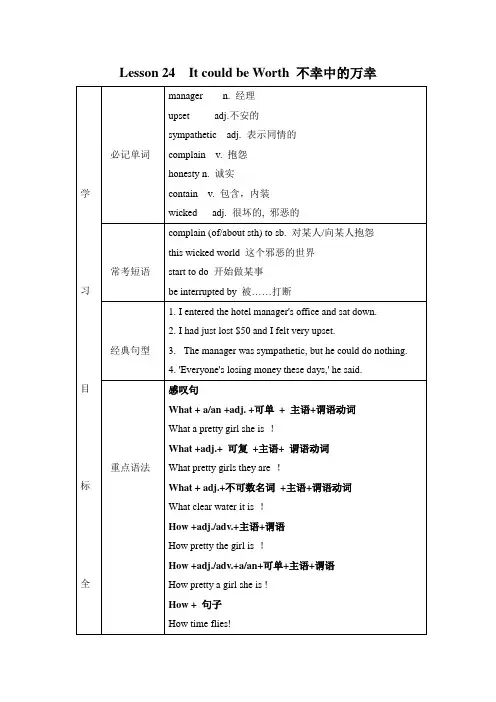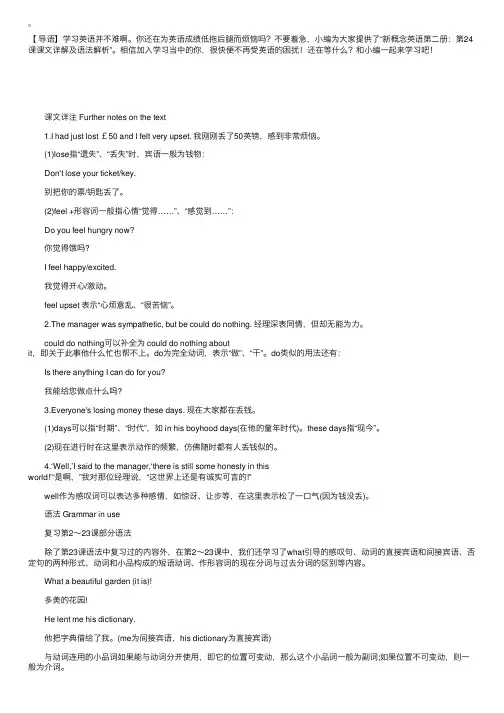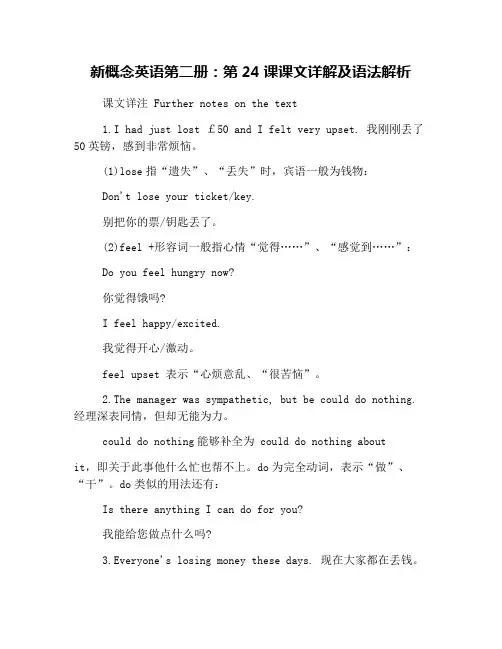新概念二 第二十四课
- 格式:ppt
- 大小:7.40 MB
- 文档页数:63

Lesson 24 It could be Worth 不幸中的万幸学习目标全必记单词manager n. 经理upset adj.不安的sympathetic adj. 表示同情的complain v. 抱怨honesty n. 诚实contain v. 包含,内装wicked adj. 很坏的, 邪恶的常考短语complain (of/about sth) to sb. 对某人/向某人抱怨this wicked world 这个邪恶的世界start to do 开始做某事be interrupted by 被……打断经典句型1.I entered the hotel manager's office and sat down.2.I had just lost $50 and I felt very upset.3.The manager was sympathetic, but he could do nothing.4.'Everyone's losing money these days,' he said.重点语法感叹句What + a/an +adj. +可单+ 主语+谓语动词What a pretty girl she is !What +adj.+ 可复+主语+ 谓语动词What pretty girls they are !What + adj.+不可数名词+主语+谓语动词What clear water it is !How +adj./adv.+主语+谓语How pretty the girl is !How +adj./adv.+a/an+可单+主语+谓语How pretty a girl she is !How + 句子How time flies!解教材全解1. I entered the hotel manager's office and sat down.我走进饭店经理的办公室,坐了下来。


【导语】学习英语并不难啊。
你还在为英语成绩低拖后腿⽽烦恼吗?不要着急,⼩编为⼤家提供了“新概念英语第⼆册:第24课课⽂详解及语法解析”。
相信加⼊学习当中的你,很快便不再受英语的困扰!还在等什么?和⼩编⼀起来学习吧! 课⽂详注 Further notes on the text 1.I had just lost £50 and I felt very upset. 我刚刚丢了50英镑,感到⾮常烦恼。
(1)lose指“遗失”、“丢失”时,宾语⼀般为钱物: Don't lose your ticket/key. 别把你的票/钥匙丢了。
(2)feel +形容词⼀般指⼼情“觉得……”、“感觉到……”: Do you feel hungry now? 你觉得饿吗? I feel happy/excited. 我觉得开⼼/激动。
feel upset 表⽰“⼼烦意乱、“很苦恼”。
2.The manager was sympathetic, but be could do nothing. 经理深表同情,但却⽆能为⼒。
could do nothing可以补全为 could do nothing aboutit,即关于此事他什么忙也帮不上。
do为完全动词,表⽰“做”、“⼲”。
do类似的⽤法还有: Is there anything I can do for you? 我能给您做点什么吗? 3.Everyone's losing money these days. 现在⼤家都在丢钱。
(1)days可以指“时期”、“时代”,如 in his boyhood days(在他的童年时代)。
these days指“现今”。
(2)现在进⾏时在这⾥表⽰动作的频繁,仿佛随时都有⼈丢钱似的。
4.‘Well,’I said to the manager,‘there is still some honesty in thisworld!’“是啊,”我对那位经理说,“这世界上还是有诚实可⾔的!” well作为感叹词可以表达多种感情,如惊讶、让步等,在这⾥表⽰松了⼀⼝⽓(因为钱没丢)。





新概念英语第二册:第24课课文详解及语法解析课文详注 Further notes on the text1.I had just lost £50 and I felt very upset. 我刚刚丢了50英镑,感到非常烦恼。
(1)lose指“遗失”、“丢失”时,宾语一般为钱物:Don't lose your ticket/key.别把你的票/钥匙丢了。
(2)feel +形容词一般指心情“觉得……”、“感觉到……”:Do you feel hungry now?你觉得饿吗?I feel happy/excited.我觉得开心/激动。
feel upset 表示“心烦意乱、“很苦恼”。
2.The manager was sympathetic, but be could do nothing. 经理深表同情,但却无能为力。
could do nothing能够补全为 could do nothing aboutit,即关于此事他什么忙也帮不上。
do为完全动词,表示“做”、“干”。
do类似的用法还有:Is there anything I can do for you?我能给您做点什么吗?3.Everyone's losing money these days. 现在大家都在丢钱。
(1)days能够指“时期”、“时代”,如 in his boyhooddays(在他的童年时代)。
these days指“现今”。
(2)现在实行时在这里表示动作的频繁,仿佛随时都有人丢钱似的。
4.‘Well,’I said to the manager,‘there is still some honesty in thisworld!’“是啊,”我对那位经理说,“这世界上还是有诚实可言的!”well作为感叹词能够表达多种感情,如惊讶、让步等,在这里表示松了一口气(因为钱没丢)。
语法 Grammar in use复习第2~23课部分语法除了第23课语法中复习过的内容外,在第2~23课中,我们还学习了what引导的感叹句、动词的直接宾语和间接宾语、否定句的两种形式、动词和小品构成的短语动词、作形容词的现在分词与过去分词的区别等内容。



新概念英语第二册24课课文Lesson 24It could be worse不幸中之万幸I entered the hotel managers office and sat down. I had just lost $50 and I felt very upset. I left the money in my room, I said, and its not there now. The manager was sympathetic, but he could do nothing. Everyones losing money these days, he said. He started to complain about this wicked world but was interrupted by a knock at the door. A girl came in and put an envelope on his desk. It contained $50. I found this outside this gentlemans room, she said. Well, I said to the manager, there is still some honesty in this world!【课文翻译】I entered the hotel managers office and sat down.我走进饭店经理的办公室,坐了下来。
I had just lost $50 and I felt very upset.我刚刚丢了50英镑,感到非常烦恼。
'I left the money in my room, 'I said,' and its not there now.'“我把钱放在房间里,”我说,“可现在没有了。
”The manager was sympathetic, but he could do nothing.经理深表同情,但却无能为力。
新概念英语第⼆册第24课课件managerwickedupsetcontain sympathetic honesty complainmanagern . 经理Eg:They want a secretary to the general manager .他们需要⼀位总经理秘书。
[ 同根词] manage v . 管理;设法management n . 管理⽅[ 考点提⽰] manage to do 意为设法做成功某事,try to do 意为设法做, 但不⼀定成功。
boss n. ⽼板(富有)head n. 头⼉,领导(表⽰重要,系亲密的⼈物)upseta . 不安的Eg: He was horribly upset over her illness .他为她的病⽽忧⼼忡忡。
v . 使⼼烦意乱Eg: The news upset me a lot .这个消息使我⼼烦意乱。
[ 同根词]upsetting adj. 令⼈苦恼的?nervous adj. 紧张,不安(事发前)sympathetica . 表⽰同情的Eg:Doctors should be sympathetic with the patients . 医⽣应对病⼈抱同情态度。
[ 同根词] sympathy n . 同情sympathetically adv . 同情地sympathize v . 表⽰同情contain ?v . 包含, 内装Eg:Sea water contains salt .海⽔含有盐。
[ 同根词] container n . 容器; 集装箱?containment n .包含container n. 集装箱,容量contain v. ⽤容器装Eg: The cup contains water. = The cup is full of water.complain ?v. 抱怨①vi. 抱怨,发牢骚,诉苦(常与of,about连⽤)complain of/about …(to sb.) 对某⼈/向某⼈抱怨……?Eg: Don’t complain about/of the weather. Eg: I compianed of my salary to my boss.②vi. 控告,抗议(与of,about连⽤)Eg: The people in that district complained to the police about the noise from that factory.那家⼯⼚噪⾳太⼤,当地的⼈们已向警⽅投诉。